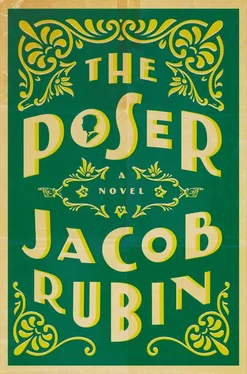“How do you experience this craziness?”
“It’s the, the bursting,” I said.
“Giovanni, why are you clapping?”
“Stop it, please!” I wrung my hands like they were someone else’s. I bucked and squirmed, wriggled like a man in a straitjacket. “You are him, aren’t you?” I said, “Jesse Unheim in disguise!” I said, “Hug me then, brother!”
And this so-called doctor, this impostor so summoned, rose. With that almost military gait (high knees, all business) as though he himself were a subordinate there to introduce an even greater eminence, he strode toward me, so I knew it was Unheim — Unheim, finally — because no psychiatrist would dare stand a foot away from his patient, as this stranger did now, in jeans and a plaid shirt, casting his eyes at wild me in that burgundy armchair. It was happening, as it had a hundred times in my dream. “An old friend,” Lou says. The steps can be heard, and a figure in a tuxedo appears, lumbering through the slatted shadows. A skeleton.
I stood. “Hug me!”
But when I opened my eyes, it was the doctor’s face, not a skeleton’s, appearing a foot from mine. He had that strong European nose, an altogether European face, which, weighed and blessed as such faces are by real history, carries more consequence than those made here, in our imaginary country. And those teeth, those absurd teeth perched on his lip, like a child who’s never learned to close his mouth at the wonders of the world.
“I’m not Jesse Unheim,” he said. He studied my eyes one at a time like a lover in a film priming himself for a catastrophic kiss. Then he grinned as he had earlier. That wry grin, it appeared on my face, too.
“I’m not Jesse Unheim,” I agreed.
A twinkle came into his eye. He gave my shoulders a fraternal squeeze and returned to his chair. “Feeling better?” he asked once in it.
I looked at my hands, amazed they were connected to my arms. “I believe I am, yes.”
“Who’s Jesse Unheim?”
The mountains, through the window, looked like a child’s cutout: two blue humps collaged against the sky. A shadow lay over the birch trees. That was the gift of the window. It freed me from the beauty. “I’d rather not say at the moment.”
“That’s fine,” the doctor assured me.
I said, “To your previous question, Doctor, the answer is yes. I am ready for these sessions. I am sure of it.”
We met the following afternoon, seated at that unnatural distance, our backs rigid against our chairs.
“When can I be released?” I asked.
“You’re registered for a hundred days’ stay. You’ve been here for seven. That leaves ninety-three.”
“Days that I am forced to stay here?”
“I wouldn’t use a word like that. But yes.”
“This is legal then?”
“Giovanni, you assaulted a man. While the victim agreed to drop the charges, the judge refused to release you without a guarantee of treatment. No More Walls satisfied him as a place for you to receive that treatment. Still, we oughtn’t think of it in those terms. Our aims are higher.”
“Is the story of this place true?” I asked.
“Which story’s that?”
“A man with syphilis knocked down all the walls.”
“That it was syphilis has not been proven. It is true he wanted all walls removed.”
“And yet walls remain,” I said.
“An admirable goal but nearly impossible to execute: a building with no walls. When it comes to Mr. Lewis’s philosophies, you’ll be pleased to know we remain quite faithful. None of our forty occupants are restrained unless it is absolutely necessary. We believe people must be given the freedom, both mental and physical, to explore the breadth of their condition.”
“Yet I am forced to stay here.”
“Giovanni, the purpose of these sessions—”
“Is for you to massage me with questions until I’m lulled into a submissive state and divulge all of my secrets.”
“Far from it,” he said. “I will be talking to you — asking questions and the like — to find out who you are. Not to correct who that person is.”
“How often do we meet?”
“Every afternoon.”
“What about you?” I asked.
“What about me?”
“Do you talk, too?”
“Of course.”
“I mean, about yourself?”
“We’re not here for me, Giovanni.”
“So your eyes insist. You have great doctor’s eyes. They are probing but not intrusive. You occupy your doctor’s chair with a kind of stiffness, so that I, the patient, am to recognize you are fit for your authoritative position without indulging it too much. Your smile reassures me that you are still human despite your duties. Do they teach all this to you in school?”
“I’m a bit confused,” he said. “Yesterday you said you were ready for this, that you were sure of it. Now you’re being standoffish.”
“I am ready, Doctor. Quite. It’s just, I’d like to know you a bit before I enter the vise of treatment.”
“The degrees are on the wall. Feel free to inspect them. I received my first degree at the City University of Medicine. Thereafter, I received a degree in psychoanalysis from the New-Method Institute.”
“A degree admits as much of a person as a gravestone, Doctor.”
“Then with my gravestone you must be satisfied,” he said. “I wanted to talk about the terrors you mentioned yesterday. Can you describe them for me?”
“Perhaps.”
“Might you try?”
“I might,” I said. “I might not.”
He smiled. “That’s very helpful.”
“I think you’re as guarded as I am.”
“Giovanni, every afternoon for the next ninety-three days you will be walked to my office. We can pass these afternoons in a kind of grudge match or we can begin the long process of treatment. The drugs, from what you told me, have helped. What you and I do here can help all the more. It is a long process — one that doesn’t always work — but you have clearly suffered. From what I understand you threatened a man with a gun.”
“A fake gun.”
“Even stranger.” He seemed to think for a moment. “What you said about me earlier — about my eyes, my posture in this chair — it’s a projection, I think.”
“If that’s some sort of doctor’s term, I don’t know it.”
“It means you are projecting your feelings onto me. You seem to think I am up to something, that I am playing a part, assuming a role, hiding behind some mask — but perhaps you are.”
My heart quickened. “Is that your specialty, then — is that how you get strangers to open up?!”
“Please. I didn’t mean to upset you.”
“I’m trying — I’m trying to finally talk and you accuse me of playing a part— ”
“My father was a psychiatrist, you know,” he said.
“What?”
“You wanted to know about me — I’ll tell you. My father started the New-Method Institute. The man was an expansive narcissist, a breed that doesn’t take to parenting, or rather, takes to it too strongly. A controlling man. A brilliant one, too. Micah Orphels.”
“Your father?” I said.
“He emigrated here from Austria, founded the Orphels Psychoanalytic Institute, one of the most influential in the world. Later, he would create the New-Method. Patients traveled across the country, some internationally, to see him. Pilgrimages. He was said to cure the incurable. But these people, they didn’t know who my father truly was. That old conundrum of celebrity. His closest friends were his patients, if that says anything. He’d have them over for dinner on Friday night. My mother would cook for all of them, and he’d criticize each one. My father would say, ‘Edgar, pass the salt,’ and if the man hesitated for just a second , he’d say, ‘Look at this unconscious hostility. So much deeply repressed anger you can’t simply pass the salt?’ That was our household. Nothing could be free of reason.”
Читать дальше












